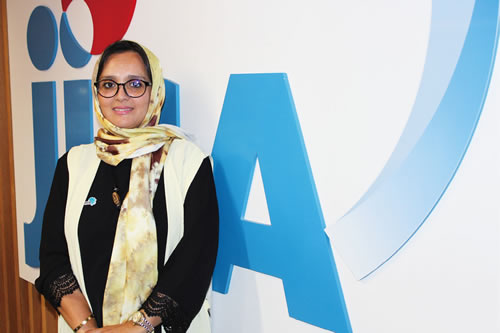Samira Chahir
Program Officer, JICA Morocco Office

Samira Chahir first encountered JICA in a magazine article, and it inspired her to join the organization and contribute to the social and economic development of her country. Eighteen years later, and now working as a Program Officer in charge of managing JICA projects in Morocco, she is certain she made the right decision.
Her work mostly involves contributing to initial identification, coordination, implementation, and evaluation of technical cooperation in the fields of environment, agriculture, and rural development. Chahir's responsibilities also include closely coordinating JICA's activities with various Moroccan government ministries to support agricultural and environmental initiatives, as well as helping foster private partnerships and facilitating research activities, and, recently, identifying and managing ODA Loan projects.
Chahir describes Morocco as a beautiful country with a high potential for growth. However, like most developing nations, it faces significant challenges that require lots of support and cooperative action to realize a path to sustainable development that also preserves the natural environment. Solid waste management is one of the major environmental threats to Morocco, and, although the government of Morocco has made significant headway, there is still much to be done to implement the national program of household waste management. What is required is a concerted strategy to enable the formulation of a long-term vision and planning; starting in March 2018, she has been in charge of one such JICA-initiated project to support the national strategy for the valorization and treatment of household and similar waste.
This two-year project advocates specific strategies for waste management that take into consideration the characteristics of each region of the country, tailoring treatment methods and facilities for their particular needs, and aims to influence future government policy in this sector. Additionally, the project will significantly contribute to sharing knowledge about waste management in Africa via the African Clean Cities Platform (ACCP), which she hopes will allow African countries to identify their real needs and the appropriate methods to handle waste and protect the environment. Chahir expects that the ACCP will also help realize effective and sustainable financial mechanisms to address the challenges related to waste management in Africa; not only developing new innovative projects to solve important problems, but also creating jobs, generating investments, and helping improve the welfare of local communities.
In her role as a coordinator within JICA Morocco, she works closely with Moroccan authorities in seeking solutions to waste problems, giving her a sense of directly contributing to the birth of a clean and healthy Africa. "Since I first entered JICA, I can safely say it has been the greatest educational opportunity of my life, where every day constitutes a new challenge and a new opportunity for me to learn more and help my country have a brighter future." She is proud to say that her contribution to JICA activities in Morocco has been significant, and has changed the lives of millions of Moroccans.




scroll